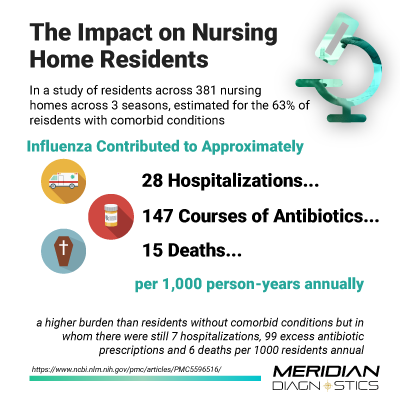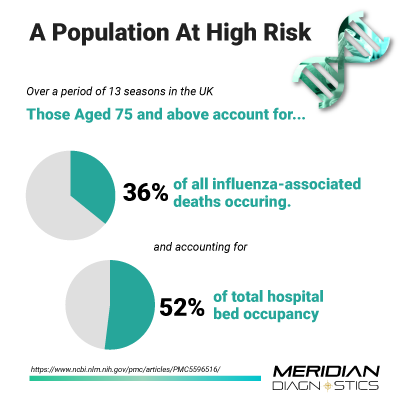Influenzas Effect on Nursing Homes & Long-Term Care Facility Residents
The Covid-19 pandemic highlighted one of the greatest concerns for nursing homes and residents of other long-term care facilities: the serious consequences of highly contagious illnesses in shared living communities. Influenza and other respiratory diseases have lasting effects on elderly people, and the effects may be heightened in long-term care facilities.
Employing the right protocols, including rapid diagnostic testing for influenza strains and outbreak management, reduces the spread of influenza in nursing homes and the effects on residents and staff members of long-term care facilities (LTCFs).
The Impact of Influenza on Nursing Homes
 People in nursing homes and other long-term care facilities, like assisted living homes, are more susceptible to the acquisition and spread of illnesses like influenza. The options for introduction are higher due to the close living arrangements, shared caregivers, and the multiple opportunities for visitors, staff members, and vendors to introduce illness into the facility.
People in nursing homes and other long-term care facilities, like assisted living homes, are more susceptible to the acquisition and spread of illnesses like influenza. The options for introduction are higher due to the close living arrangements, shared caregivers, and the multiple opportunities for visitors, staff members, and vendors to introduce illness into the facility.
Furthermore, elderly residents and those in nursing homes are more susceptible to influenza because of poor health complications. Seasonal influenza eruptions have a high attack rate in residents, and the presence of comorbidities in many residents can lead to multiple complications for LTCF residents.
Elderly people and those with a compromised immune system have a higher incidence of complications from influenza variants, especially pneumonia, and may require hospitalization. Furthermore, the chances of reinfection are high, as many residents remain in close quarters.
Influenza Containment Through Rapid Testing
Although the influenza vaccine is less effective for elderly people and those with comorbidities, it is still effective in reducing the spread of influenza in LTCFs. The CDC still recommends that caregivers and residents of long-term care communities get the annual flu vaccine. The HCW vaccine is also an effective tool to reduce the spread of influenza among the elderly or weak. It protects caregivers and can act as a barrier to transmission to others. And, it's an effective way to reduce the risks of cardiopulmonary complications and hospitalizations.
Early detection of an influenza outbreak in a long-term care facility can help reduce the spread to more vulnerable residents. Access to rapid testing when a resident shows the first symptoms of influenza can help reduce the spread, enabling the facility director to establish a quarantine for infected residents and limit the number of caregivers in the isolation ward.
Because the incubation period of influenza is relatively short, usually about one to four days from initial exposure. That, coupled with a serial interval (the time between the onset of symptoms in a secondary case of influenza and those of the primary case), means that the virus will spread rapidly through close quarters.
Unfortunately, the spread of influenza from caregivers or hospital workers to patients is also common. Testing caregivers should be part of the protocol for LTCFs, keeping those who are sick with the influenza virus at home or working in other support roles that don't involve personal interaction with the vulnerable residents. Rapid testing, including daily testing, of caregivers may be an option for facility directors who are responsible for particularly vulnerable residents.
Planning, Training, and Containment of Influenza in LTCFs
 Some facilities may institute weekly testing of all residents to detect influenza-even before symptoms start. Either way, rapid results allow facility care directors to act swiftly, protecting their residents and taking measures to reduce the chances of complications. Sometimes,s early detection can help treatmetns be more effective.
Some facilities may institute weekly testing of all residents to detect influenza-even before symptoms start. Either way, rapid results allow facility care directors to act swiftly, protecting their residents and taking measures to reduce the chances of complications. Sometimes,s early detection can help treatmetns be more effective.
However, not all rapid influenza tests are the same. Accuracy is critical to rapid testing, both to identify sick people who can respond to early treatment and to allow negative-testing caregivers to continue their duties.
Creating a plan to reduce the spread of influenza and other respiratory viruses, including Covid variants, can help every long-term care facility's preparation to reduce illness. Including rapid testing from a reliable lab should be part of that plan.
Choose the Right Lab For Reliable Rapid Testing For Influenza
The ability of a long-term care facility to react to and contain the spread of influenza depends on the reliability of its diagnostic lab for testing results. Meridian Diagnostics offers full viral panel testing, completed by its two QuantStudio Real-Time PCR instruments. This leading-edge medical technology ensures swift, accurate results. We are a multi-disciplinary laboratory committed to focused and efficient testing for long-term care facilities.
Contact us today to learn more about how easy our diagnostic services are to use. Our fast results can help you protect the most vulnerable residents and those likely to suffer complications of influenza.


